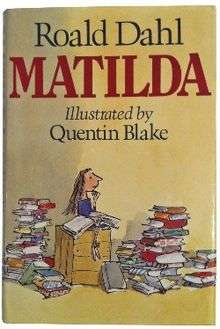Matilda (novel)
 First UK edition | |
| Author | Roald Dahl |
|---|---|
| Illustrator | Quentin Blake |
| Country | United Kingdom |
| Language | English |
| Genre | Juvenile Humour/Classic |
| Published | 1 October 1988 |
Matilda is a children's novel by British writer Roald Dahl. It was published in 1988 by Jonathan Cape in London, with 232 pages and illustrations by Quentin Blake. It was adapted as an audio reading by Joely Richardson, a 1996 feature film, a two-part BBC Radio 4 program starring Nicola McAuliffe as Matilda and narrated by Lenny Henry, and a 2010 musical.[1][2]
In 2012 Matilda was ranked number 30 among all-time children's novels in a survey published by School Library Journal, a monthly with primarily U.S. audience. It was the first of four books by Dahl among the Top 100, more than any other writer.[3]
Plot summary
In a small Buckinghamshire village, Matilda is a young girl of unusual precocity, but often ill-treated by her father or neglected by her mother. In retaliation, she pulls pranks such as gluing her father's hat to his head, hiding a friend's parrot in the chimney to simulate a burglar or ghost, and secretly bleaching her father's hair.
At school, Matilda befriends her teacher, Jennifer Honey, who is astonished by Matilda's intellectual abilities. She tries to move her into a higher class, but is refused by the headmistress, the tyranical Agatha Trunchbull. Miss Honey also tries to talk to Mr. and Mrs. Wormwood about Matilda's supreme intelligence, but they ignore her.
Matilda quickly develops a particularly strong bond with Miss Honey and watches as Miss Trunchbull terrorizes her students with creative, over-the-top punishments. When Matilda's friend, Lavender, plays a practical joke on Miss Trunchbull by placing a newt in her jug of water, Matilda uses an unexpected power of telekinesis to tip the glass of water containing the newt onto Miss Trunchbull.
After Matilda reveals her powers to Miss Honey, Miss Honey reveals that she was raised by an abusive aunt after the suspicious death of her father. Her aunt is revealed to be Miss Trunchbull herself, who appears (among other misdeeds) to withhold her niece's inheritance, with the result of Miss Honey living in poverty in a derelict farm cottage. In preparation to avenge the latter, Matilda develops her telekinetic gift through practice at home. Later, during a lesson that Miss Trunchbull is teaching, Matilda telekinetically raises a piece of chalk against the blackboard and, in the resulting writings, poses as the spirit of Miss Honey's late father, demanding that Miss Trunchbull concede Miss Honey's house and wages and leave the region forever.
This is soon accomplished, and with the approval of the school's capable and good-natured new Headteacher, Mr. Trilby, Matilda herself advances to the highest level of schooling. Rather to her relief, she is no longer capable of telekinesis; this explained by Miss Honey as the result of using her mind in a more challenging curriculum.
Matilda continues to visit Miss Honey at her house regularly, but one day she finds her parents hastily packing to escape from the police who have incriminated her father for selling stolen cars. Matilda asks permission to live with Miss Honey, to which her parents rather uninterestedly agree, and so she and Miss Honey both find their happy ending.
Adaptations
The novel was made into the film Matilda in 1996. It was directed by Danny DeVito and starred Mara Wilson as Matilda. Although the film was not a box office success, it received critical acclaim at the time of its release, and holds a "fresh" rating of 90% on Rotten Tomatoes. DeVito portrayed Mr. Wormwood as well as the narrator.
In 1990, the Redgrave Theatre, Farnham produced a musical version, adapted by Rony Robinson with music by Ken Howard and Alan Blaikley, which toured the UK. It starred Annabelle Lanyon as Matilda and Jonathan Linsley as Miss Trunchbull, and had mixed reviews.[4] A second musical version of the novel, Matilda The Musical, written by Dennis Kelly and Tim Minchin and commissioned by the Royal Shakespeare Company, premiered in November 2010. It opened at the Cambridge Theatre in the West End on 24 November 2011.[1][5] It later opened on Broadway on 11 April 2013 at the Shubert Theatre. The Musical has since opened a U.S tour and opened in July 2015 in Australia, so far all productions have accumulated a total of 48 Matildas, 2 of whom will be starting in mid-late September. The stage version has become hugely popular with audiences and praised by critics, with one critic calling it "the best British musical since Billy Elliot".[2]
Connections to other Roald Dahl books
One of Miss Trunchbull's punishments is to forcibly make an overweight boy named Bruce Bogtrotter eat an enormous cake to make him sick, after finding him guilty of stealing cake from the kitchen. In Roald Dahl's Revolting Recipes one of the recipes is based on that cake; whereas Bruce is a more sympathetic variation of Augustus Gloop (from "Charlie and the Chocolate Factory") and similar gluttons, and made something of a hero by finishing the cake without suffering nausea.[6]
References
- 1 2 Serena Alllot (26 November 2010) Waltzing Matilda: Dahl's classic dances on to the stage The Daily Telegraph
- 1 2 Once upon a time, there was a man who liked to make up stories ... The Independent (Sunday, 12 December 2010)
- ↑ Bird, Elizabeth (7 July 2012). "Top 100 Chapter Book Poll Results". A Fuse #8 Production. Blog. School Library Journal (blog.schoollibraryjournal.com). Retrieved 2015-10-26.
- ↑ "The ‘Other’ Matilda Musical | Safety Curtain". Safetycurtain.wordpress.com. Retrieved 2013-09-20.
- ↑ "RSC Sets Dates for Dahl’s Matilda Musical, 9 Nov". What'sOnStage.com. 30 September 2009. Retrieved 2010-04-07.
- ↑ Long, Dorothy. Revolting recipes.
| ||||||
|